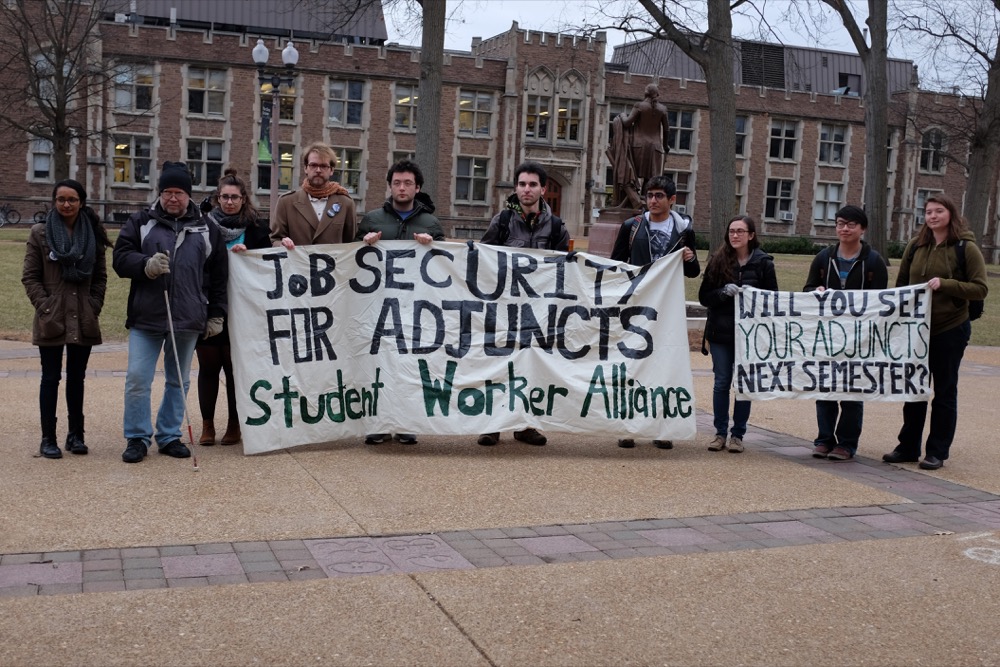News
Unionization focus shifts from lecturers to graduate students
This past April, Washington University lecturers planned to unionize under the Service Employees International Union Local 1, an organization through which adjunct faculty unionized in April 2016. Although lecturers were gaining momentum in the spring, the vote failed to go through, and the discussion ended with the Service Employees International Union Local 1 this summer.
 Holly Ravazzolo | Student Life
Holly Ravazzolo | Student Life The Student Worker Alliance organizes a march to Chancellor Mark Wrighton in March 2016. Although adjunct professors have since unionized, graduate students at the University now hope to gain the opportunity to form a union of their own.
Since the vote did not pass, a number of lecturers have developed frustrations, resulting in one departing from the University entirely. In April, some noted that the University had been sending emails encouraging lecturers to consider their options prior to unionizing under Service Employees International Union Local 1 (SEIU). Valeria Souza, a former Washington University lecturer in Portuguese, said that she believed they were “intended to intimidate.”
“I can imagine why it was the final straw for a lot of people,” Erik Strobl, an adjunct faculty member, said. “Without a union, you don’t get representation. You don’t get a voice; you don’t get legal recognition, so if you can’t determine anything about your employment, that’s frustrating. I can see someone leaving over that.”
Strobl was on the bargaining unit of adjunct unionization and had been helping the lecturers campaign for unionization. Although the vote did not pass, Strobl said the focus has now shifted towards graduate students organizing a union of their own.
“The adjuncts have had a contract in place since last summer; we had our bargaining and ratification. We’re working under the contract, which has been really good. It’s been fantastic. So, we’re trying to get the grad workers under something similar,” Strobl said.
Despite the difficulty lecturers faced in unionizing this spring, the graduate students are hopeful. On Aug. 23, 2016, the National Labor Relations Board ruled in favor of graduate students’ entitlement to collective bargaining under the National Labor Relations Act. This reversed a 2004 NLRB ruling against graduate students unionizing at Brown University. Since then, graduate students across the country have been campaigning for labor unions at their respective universities.
“Basically, what’s happening is that we’re working with the SEIU to gain support and momentum and support on campus among graduate student workers, and then [we want] have an election as soon as we can to pressure the University into recognizing our union and to allow us to come to the table and work on a labor contract with them,” Meredith Kelling, a Ph.D. candidate in English Literature, said.
Kelling explained that the graduate students’ main grievance is that since they are not recognized by employers, they are not eligible for the same rights and protections that are legally offered to employees. Although graduate students are working towards degrees, they also provide services to the University as teaching assistants and research assistants.
“We’re in this unsafe space, where if there were a medical or life event it would make it difficult for us to complete our work,” Kelling said. “What we want to do is ensure our own academic success and our success as workers at the University…We do think that it would improve the culture of the University as a whole if we were given an opportunity not to have to choose between our academic success and our personal well-being.”
“[The grad students] deserve it,” Erik Strobl said. “Right now, we’re hearing from people who don’t have guaranteed medical care or summer funding. The University wants to treat grad workers as if they’re slightly older undergrad[uates], but they’re people who have kids and families and who actually need medical and dental care, which they either can’t afford or don’t have access to—I think it’d be really easy for a place like this to give them that.”
